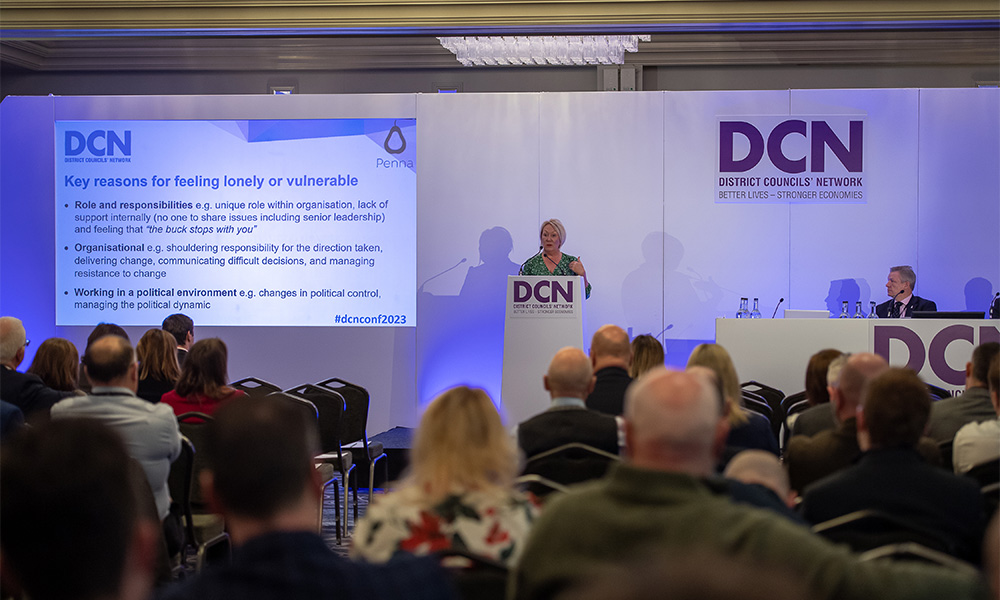It's always a pleasure to attend the District Councils’ Network (DCN) conference as it's a great opportunity to hear what's going on in the work of district councils. After a pandemic and the last few years, it was clear to see from the extensive attendance and energy that others agreed and enjoyed the chance to learn from the room.
The mood was positive and resilient, and was further enhanced when the after-dinner speaker, the one and only Professor Sir Jonathan Van-Tam, (or JVT next slide please as he’s become known) rightly pointed out how pivotal and lifesaving districts has been in supporting their communities during covid.
Whilst THANK YOU never seems enough for what was done by so many in the DCN, it was good to hear - much welcomed, deserved and appreciated by all.
The positivity in the room epitomised the spirit that district councils are resilient, up for the challenges ahead, and determined to take the learning from covid to continue working in partnership to punch above their weight. Their knowledge and understanding of local communities made the difference in the pandemic and should be developed and utilised as we support families through the cost-of-living crisis.
Learnings for Penna and for District Councils’ Chief Executives
I was at the conference to network and learn, both of which the conference provided, but I was also there to chair a closed session with chief executives. My panel were Matt Prosser, President of Solace and Chief Executive of Dorset Council, Dan Gascoyne, the new Chief Executive of Braintree council, and Yvonne Rees, Chief Executive at Cherwell DC, who was unfortunately under the weather and much missed.
Prior to the session, the DCN carried out some research with Chief Executives (CEX’s) which said that 78.7% of respondents had felt vulnerable occasionally or regularly, and had 86.9% saying, perhaps not surprisingly, that it was sometimes lonely in the top job. Our session aimed to provide support for CEX’s and connect them to networks, and find out more about how the DCN might help going forward.
Dealing with the pressures of being Chief Executive
The session focused on the importance of the CEX role and the privilege it provides, but also of the leadership pressure and loneliness that good CEX’s need to prepare for and get support with. Matt talked eloquently about the need for networks outside the organisation and good peer groups to be able to call upon when you need confidential advice, when it is not appropriate to discuss things with your senior leadership team.
Dan shared his experience of taking on the CEX role recently and of the instant recognition and focus the role brought from everyone, including the local community, and how you needed to be ready for this, and resilient to criticism that will be targeted towards you if decisions aren’t popular.
Matt spoke about the importance of gaining support from other CEX’s and organisations such as SOLACE, DCN and LGA; and for him the importance of taking time out away from the job, to be healthy for the job.
Practical tips for Chief Executives
Having had the privilege of speaking to, appointing and working with so many CEXs, I see first-hand how lonely the role can be, and even though most say it’s the best job in the world, it’s clear that as a senior leader with no peer group, and whilst it’s important to trust your senior team, there can be a danger in oversharing or the organisation can the senior team is too close and won’t raise concerns. Whilst there are some in senior roles that think it ‘weak’ to reach out for a coach or mentor, it was good to see from the survey and in the audience that many in the DCN recognised the real ‘strength’ in doing so.
The conversation was energised and supportive, and there’s no doubt that DCN and other network groups are invaluable in helping CEXs realise they are not facing issues alone, and with such fantastic feedback to the survey I’m sure DCN will be building on this and developing further support for current and future Chief Executives. As one delegate said; ‘we need to do more to prepare those taking on the job’, and who can argue with that? Indeed, I shall be taking the learning directly into our Cohort 3 Aspirant Chief Executive Programme which started in February. The more prepared, the more successful leaders will be, and that’s what the sector needs if it is going to innovate and navigate its way through continued financial pressures.




